| Listing 1 - 10 of 12 | << page >> |
Sort by
|
Dissertation
Year: 2004 Publisher: Enschede Febodruk
Abstract | Keywords | Export | Availability | Bookmark
 Loading...
Loading...Choose an application
- Reference Manager
- EndNote
- RefWorks (Direct export to RefWorks)
Pain Measurement --- Nursing Assessment --- Pain --- Intellectual Disability --- methods --- methods --- nursing --- nursing
Book
Year: 2004 Publisher: Washington, D.C. : President's Committee for People with Intellectual Disabilities,
Abstract | Keywords | Export | Availability | Bookmark
 Loading...
Loading...Choose an application
- Reference Manager
- EndNote
- RefWorks (Direct export to RefWorks)
Intellectual disability --- People with mental disabilities --- Care --- Planning. --- Government policy --- Services for --- United States.
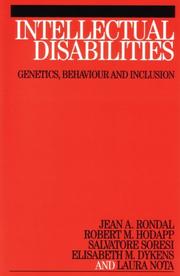
ISBN: 1861563507 Year: 2004 Publisher: London Whurr Publishers
Abstract | Keywords | Export | Availability | Bookmark
 Loading...
Loading...Choose an application
- Reference Manager
- EndNote
- RefWorks (Direct export to RefWorks)
Intelligentie --- Erfelijkheidsleer --- Gedrag --- Gedragsproblemen --- Gedragsprobleem --- Adaptation scolaire --- Adaptation sociale --- Comportement --- Déficience intellectuelle --- Génétique --- Intégration sociale --- Langage --- People with mental disabilities --- Intellectual disability. --- Inclusive education. --- Handicapés mentaux. --- Intégration scolaire. --- Déficience intellectuelle. --- Education. --- Genetic aspects --- Education --- Aspect génétique

ISBN: 1282254448 9027295514 9786612254444 1423772377 9781423772378 9789027295514 9781588114945 1588114945 9789027252951 9027252955 Year: 2004 Publisher: Amsterdam Benjamins
Abstract | Keywords | Export | Availability | Bookmark
 Loading...
Loading...Choose an application
- Reference Manager
- EndNote
- RefWorks (Direct export to RefWorks)
Williams Syndrome (WS), aka Williams Beuren Syndrome, is a developmental disorder that we have known about for some forty years. The cause for WS was detected only recently: a micro deletion on chromosome 7, more specifically at the region of chromosome 7q11.23. The cognitive and behavioral profile in WS is characterized by a marked discrepancy between verbal and non-verbal skills combined with relatively spared linguistic skills. Recent research has shown considerable progress defining the areas of intactness in linguistic abilities. This volume builds on that research, giving an overview of the psycholinguistic research undertaken and opening up new perspectives and insights through new data and analyses. This book is of interest to researchers of applied cognitive science and to linguists more occupied with theoretical research.
Williams syndrome --- Language disorders in children --- Communicative disorders in children --- Beuren syndrome --- Contiguous gene syndrome --- Elfin facies syndrome --- Fanconi-Schlesinger syndrome --- Idiopathic hypercalcemia-supravalvular aortic stenosis syndrome --- Supravalvar aortic stenosis syndrome --- Williams-Barratt syndrome --- Williams-Beuren syndrome --- Williams contiguous gene syndrome --- Aortic valve stenosis in children --- Intellectual disability --- Syndromes in children --- Patients --- Language --- Neuropathology --- Sociolinguistics --- Psycholinguistics
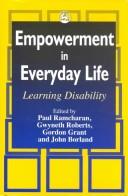
ISBN: 1853023825 Year: 2004 Publisher: London Jessica Kingsley
Abstract | Keywords | Export | Availability | Bookmark
 Loading...
Loading...Choose an application
- Reference Manager
- EndNote
- RefWorks (Direct export to RefWorks)
Learning disabled --- People with mental disabilities --- Intellectually disabled persons --- Mental disabilities, People with --- Mentally deficient persons --- Mentally disabled persons --- Mentally disordered persons --- Mentally handicapped --- Mentally retarded persons --- People with intellectual disabilities --- Retarded persons --- People with disabilities --- Intellectual disability --- Mentally ill --- Mental retardation services --- LD adults --- Learning disabled adults --- Slow-learning adults --- Services for --- Social conditions
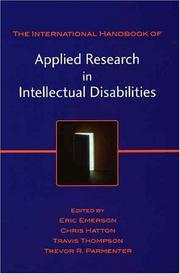
ISBN: 0471497096 Year: 2004 Publisher: West Sussex Wiley
Abstract | Keywords | Export | Availability | Bookmark
 Loading...
Loading...Choose an application
- Reference Manager
- EndNote
- RefWorks (Direct export to RefWorks)
People with mental disabilities --- Learning disabilities --- Troubles de l'apprentissage --- Maladies mentales --- Research --- #PBIB:2004.3 --- personen met een mentale beperking --- Social policy and particular groups --- Intellectually disabled persons --- Mental disabilities, People with --- Mentally deficient persons --- Mentally disabled persons --- Mentally disordered persons --- Mentally handicapped --- Mentally retarded persons --- People with intellectual disabilities --- Retarded persons --- People with disabilities --- Intellectual disability --- Mentally ill --- Learning disorders --- Cognition disorders --- Disabilities --- Minimal brain dysfunction in children --- Research. --- Troubles de l'apprentissage. --- Maladies mentales.
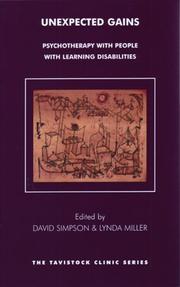
ISBN: 0429909357 0429484585 1282900943 9786612900945 1849404534 9781849404532 9781855759640 1855759640 0429923589 Year: 2004 Publisher: London New York Karnac Books
Abstract | Keywords | Export | Availability | Bookmark
 Loading...
Loading...Choose an application
- Reference Manager
- EndNote
- RefWorks (Direct export to RefWorks)
Psychoanalytic psychotherapy is a new development in the treatment of people with learning disabilities and mental health problems, which traditionally has utilised behavioural management and limited counselling. The papers collected here have evolved from the work of the pioneering Learning Disabilities Service at the Tavistock Clinic, London, which is made up from specialised professionals from the fields of psychology, psychiatry, child and adolescent psychotherapy, adult psychotherapy and social work. The service mainly offers individual psychotherapy but also provides group work, parent work, family therapy and consultative work with professionals where necessary.
Psychotherapy. --- Child psychotherapy. --- Learning disabled. --- Learning disabled children. --- People with mental disabilities. --- Intellectually disabled persons --- Mental disabilities, People with --- Mentally deficient persons --- Mentally disabled persons --- Mentally disordered persons --- Mentally handicapped --- Mentally retarded persons --- People with intellectual disabilities --- Retarded persons --- People with disabilities --- Intellectual disability --- Mentally ill --- Children with mental disabilities --- LD adults --- Learning disabled adults --- Slow-learning adults --- People with mental disabilities --- Child mental health services --- Child psychiatry --- Children --- Psychotherapy --- Psychagogy --- Therapy (Psychotherapy) --- Mental illness --- Clinical sociology --- Mental health counseling --- Diseases --- Treatment
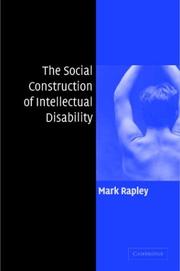
ISBN: 9780511489884 9780521809009 9780521005296 0511489889 0511215967 9780511215964 0511206992 9780511206993 0511212364 9780511212369 0511210590 9780511210594 0521809002 0521005299 0511214170 9780511214172 128054015X 9781280540158 1107144086 0511314949 Year: 2004 Publisher: Cambridge New York Cambridge University Press
Abstract | Keywords | Export | Availability | Bookmark
 Loading...
Loading...Choose an application
- Reference Manager
- EndNote
- RefWorks (Direct export to RefWorks)
Intellectual disability is usually thought of as a form of internal, individual affliction, little different from diabetes, paralysis or chronic illness. This study, the first book-length application of discursive psychology to intellectual disability, shows that what we usually understand as being an individual problem is actually an interactional, or social, product. Through a range of case studies, which draw upon ethnomethodological and conversation analytic scholarship, the book shows how persons categorized as 'intellectually disabled' are produced, as such, in and through their moment-by-moment interaction with care staff and other professionals. Mark Rapley extends and reformulates current work in disability studies and offers a reconceptualisation of intellectual disability as both a professionally ascribed diagnostic category and an accomplished - and contested - social identity. Importantly, the book is grounded in data drawn from naturally-occurring, rather than professionally orchestrated, social interaction.
People with mental disabilities. --- Social interaction. --- Group identity. --- Collective identity --- Community identity --- Cultural identity --- Social identity --- Identity (Psychology) --- Social psychology --- Collective memory --- Human interaction --- Interaction, Social --- Symbolic interaction --- Exchange theory (Sociology) --- Psychology --- Intellectually disabled persons --- Mental disabilities, People with --- Mentally deficient persons --- Mentally disabled persons --- Mentally disordered persons --- Mentally handicapped --- Mentally retarded persons --- People with intellectual disabilities --- Retarded persons --- People with disabilities --- Intellectual disability --- Mentally ill --- Health Sciences --- Psychiatry & Psychology
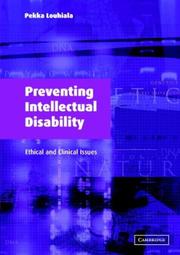
ISBN: 1107137985 0521533716 0511307942 0511121458 9786610161454 0511205120 0511543980 0511071043 1280161450 0511062583 0521826330 Year: 2004 Publisher: Cambridge, UK ; New York : Cambridge University Press,
Abstract | Keywords | Export | Availability | Bookmark
 Loading...
Loading...Choose an application
- Reference Manager
- EndNote
- RefWorks (Direct export to RefWorks)
This is the first book that covers comprehensively the difficult ethical issues involved in prevention of intellectual disability (learning disability, mental retardation). These issues are discussed both practically and theoretically in the light of four case examples drawn from real life. The cases demonstrate various issues raised by the concept of preventing intellectual disability, including definition, epidemiology, screening, and genetic counselling. Two major approach models (reproductive autonomy and public health) are scrutinised, and the practical issues of prevention are examined closely with respect to three syndromes (Down, Fragile X, and Aspartylugosaminuria). The question 'Why should intellectual disability be prevented?' is examined thoroughly at each stage. As a paediatrician and a philosopher, Dr Louhiala presents the issues in a way that is both user-friendly and philosophically sound.
Intellectual disability --- Learning disabilities --- Genetic counseling --- Genetic screening --- Medical ethics. --- Biomedical ethics --- Clinical ethics --- Ethics, Medical --- Health care ethics --- Medical care --- Medicine --- Bioethics --- Professional ethics --- Nursing ethics --- Social medicine --- Health counseling --- Learning disorders --- Cognition disorders --- Disabilities --- Minimal brain dysfunction in children --- Idiocy --- Intellectual disabilities --- Mental deficiency --- Mental retardation --- Developmental disabilities --- Psychology, Pathological --- People with mental disabilities --- Prevention --- Moral and ethical aspects. --- Genetic aspects. --- Moral and ethical aspects --- Health Sciences --- General and Others
Dissertation
ISBN: 9052784337 Year: 2004 Publisher: Maastricht Universitaire Pers Maastricht
Abstract | Keywords | Export | Availability | Bookmark
 Loading...
Loading...Choose an application
- Reference Manager
- EndNote
- RefWorks (Direct export to RefWorks)
Intellectual Disability --- Disability Evaluation. --- Residence Characteristics. --- Social Environment. --- #PBIB:2005.2 --- #PBIB:gift 2005 --- Environment, Social --- Social Ecology --- Ecologies, Social --- Ecology, Social --- Environments, Social --- Social Ecologies --- Social Environments --- Environment --- Community --- Domicile --- Living Arrangements --- Neighborhood --- Place of Birth --- Residential Selection --- Arrangement, Living --- Arrangements, Living --- Birth Place --- Characteristic, Residence --- Characteristics, Residence --- Communities --- Domiciles --- Living Arrangement --- Neighborhoods --- Residence Characteristic --- Residential Selections --- Selection, Residential --- Selections, Residential --- Disability Evaluations --- Evaluation, Disability --- Evaluations, Disability --- Eligibility Determination --- Rehabilitation --- Workers' Compensation --- International Classification of Functioning, Disability and Health --- diagnosis. --- Theses --- Social Context --- Context, Social --- Contexts, Social --- Social Contexts --- Disability Evaluation --- Residence Characteristics --- Social Environment --- diagnosis
| Listing 1 - 10 of 12 | << page >> |
Sort by
|

 Search
Search Feedback
Feedback About UniCat
About UniCat  Help
Help News
News